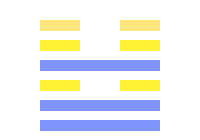26.1.2.3.4 (26 > 35)

26.1.2.3.4 (26 > 35) - THE TÂ KHÛ HEXAGRAM.
- 1. The first line, undivided, shows its subject in a position of peril. It will be advantageous for him to stop his advance.
- 2. The second line, undivided, shows a carriage with the strap under it removed.
- 3. The third line, undivided, shows its subject urging his way with good horses. It will be advantageous for him to realise the difficulty (of his course), and to be firm and correct, exercising himself daily in his charioteering and methods of defence; then there will be advantage in whatever direction he may advance.
- 4. The fourth line, divided, shows the young bull, (and yet) having the piece of wood over his horns. There will be great good fortune.
26.1.2.3.4 (26 > 35) - Having the required capacities
One knows the ways and means by which one can succeed in doing what was planned.
Bing DeepL Google Yandex26.1.2.3.4 (26 > 35) - Having the required capacities
One knows the ways and means by which one can succeed in doing what was planned.
Bing DeepL Google Yandex26.1.2.3.4 (26 > 35) - Tá tchu, le pouvoir contraignant de la grandeur
Tá tchu : 1. Grand entretien ; 2. Dompter, conduire
- 1. Quand il survient quelque danger, il est bon de s’arrêter (se vaincre), de céder aux circonstances et de ne point vouloir l’emporter de force.
- 2. (Comme, par exemple, quand) un char a perdu le cuir qui le maintient en place (droit).
- 3. Celui qui chemine avec des chevaux bien entretenus, sortira heureusement des difficultés. S’il s’exerce chaque jour à conduire et combattre, tout réussira pour lui. (Suite de la bonne éducation.)
- 4. Le joug, la planchette que porte le jeune boeuf est d’un usage très heureux pour le dompter et le former au labourage (second sens).
26.1.2.3.4 (26 > 35) - Avoir les capacités requises
On connaît les voies et les moyens par lesquels on peut réussir à faire ce qu'on avait prévu.
Bing DeepL Google Yandex26.1.2.3.4 (26 > 35) - Ellenőrzés
- 1. Nem akar menni és azonnal megnézni mert nem olyan fontos.
- 2. Otthagyja mert nem bíznak benne.
- 3. Elkíséri.
- 4. A másik erőszakosságának kezelése adakozással.
Les trigrammes
Les trigrammes sont des combinaisons de trois traits yin et yang. Dans l'hexagramme, les trois traits du dessous constituent le trigramme inférieur et représentent la situation intérieure. Les trois lignes du haut constituent le trigramme supérieur et représentent la situation extérieure.
Trigramme supérieur : La montagne Le feu


Trigramme inférieur : Le ciel La terre


La formation: 26
What is already there

26 - THE TÂ KHÛ HEXAGRAM.
Under the conditions of Tâ Khû it will be advantageous to be firm and correct. (If its subject do not seek to) enjoy his revenues in his own family (without taking service at court), there will be good fortune. It will be advantageous for him to cross the great stream.
Bing DeepL Google Yandex26 - Checking
See if everything is alright. That way, one will find the invisible problems.
Bing DeepL Google Yandex26 - Checking
See if everything is alright. That way, one will find the invisible problems.
Bing DeepL Google Yandex26 - Tá tchu, le pouvoir contraignant de la grandeur
Tá tchu : 1. Grand entretien ; 2. Dompter, conduire
Texte
Grand, bon entretien. Il affermit et perfectionne. Si l’on ne ruine pas sa maison (la dévore), ce sera bien ; on traversera heureusement les difficultés.
Symbolisme
C’est une montagne dans le ciel (le ciel au milieu). Le sage, comprenant toute chose, discute d’abord, puis agit, pour entretenir ainsi sa vertu.
Commentaire
Le grand entretien, c’est le fort affermissant sa droiture, sa justice, répandant un brillant éclat ; renouvelant chaque jour ses vertus. Fort et élevé, il met la sagesse au-dessus de tout ; il peut s’établir fermement en une droiture extrême. Il entretient surtout la sagesse ; il répond aux ordonnances du ciel.
26 - La vérification
Aller voir si tout va bien. Ainsi on découvrira les problèmes invisibles.
Bing DeepL Google Yandex26 - Ellenőrzés
Megnézni hogy minden rendben van-e. Ily módon felfedezheti a rejtett problémákat.
Bing DeepL Google Yandex
26.1 (26 > 18) - THE TÂ KHÛ HEXAGRAM.
The first line, undivided, shows its subject in a position of peril. It will be advantageous for him to stop his advance.
Bing DeepL Google Yandex26.1 (26 > 18) - Staying away
One doesn't want to go and see it immediately because it is less important.
Bing DeepL Google Yandex26.1 (26 > 18) - Staying away
One doesn't want to go and see it immediately because it is less important.
Bing DeepL Google Yandex26.1 (26 > 18) - Tá tchu, le pouvoir contraignant de la grandeur
Tá tchu : 1. Grand entretien ; 2. Dompter, conduire
Quand il survient quelque danger, il est bon de s’arrêter (se vaincre), de céder aux circonstances et de ne point vouloir l’emporter de force.
Bing DeepL Google Yandex26.1 (26 > 18) - Rester à l'écart
On ne veut pas aller voir tout de suite car c'est moins important.
Bing DeepL Google Yandex26.1 (26 > 18) - Ellenőrzés
Nem akar menni és azonnal megnézni mert nem olyan fontos.
Bing DeepL Google Yandex
26.2 (26 > 22) - THE TÂ KHÛ HEXAGRAM.
The second line, undivided, shows a carriage with the strap under it removed.
Bing DeepL Google Yandex26.2 (26 > 22) - Being sidelined
One leaves because one is not being trusted.
Bing DeepL Google Yandex26.2 (26 > 22) - Being sidelined
One leaves because one is not being trusted.
Bing DeepL Google Yandex26.2 (26 > 22) - Tá tchu, le pouvoir contraignant de la grandeur
Tá tchu : 1. Grand entretien ; 2. Dompter, conduire
(Comme, par exemple, quand) un char a perdu le cuir qui le maintient en place (droit).
Bing DeepL Google Yandex26.2 (26 > 22) - Être mis sur la touche
On part car on ne nous fait pas confiance.
Bing DeepL Google Yandex
26.3 (26 > 41) - THE TÂ KHÛ HEXAGRAM.
The third line, undivided, shows its subject urging his way with good horses. It will be advantageous for him to realise the difficulty (of his course), and to be firm and correct, exercising himself daily in his charioteering and methods of defence; then there will be advantage in whatever direction he may advance.
Bing DeepL Google Yandex26.3 (26 > 41) - Following one's partner
One is accompanied by someone who is pursuing the same goal.
Bing DeepL Google Yandex26.3 (26 > 41) - Following one's partner
One is accompanied by someone who is pursuing the same goal.
Bing DeepL Google Yandex26.3 (26 > 41) - Tá tchu, le pouvoir contraignant de la grandeur
Tá tchu : 1. Grand entretien ; 2. Dompter, conduire
Celui qui chemine avec des chevaux bien entretenus, sortira heureusement des difficultés. S’il s’exerce chaque jour à conduire et combattre, tout réussira pour lui. (Suite de la bonne éducation.)
Bing DeepL Google Yandex26.3 (26 > 41) - Suivre son partenaire
On est accompagné par quelqu'un qui poursuit le même but.
Bing DeepL Google Yandex
26.4 (26 > 14) - THE TÂ KHÛ HEXAGRAM.
The fourth line, divided, shows the young bull, (and yet) having the piece of wood over his horns. There will be great good fortune.
Bing DeepL Google Yandex26.4 (26 > 14) - Surrendering to the resistance
One controls the other's aggressiveness by yielding.
Bing DeepL Google Yandex26.4 (26 > 14) - Surrendering to the resistance
One controls the other's aggressiveness by yielding.
Bing DeepL Google Yandex26.4 (26 > 14) - Tá tchu, le pouvoir contraignant de la grandeur
Tá tchu : 1. Grand entretien ; 2. Dompter, conduire
Le joug, la planchette que porte le jeune boeuf est d’un usage très heureux pour le dompter et le former au labourage (second sens).
Bing DeepL Google Yandex26.4 (26 > 14) - Se rendre à la résistance
On maîtrise l'agressivité de l'autre en cédant.
Bing DeepL Google YandexEn préparation : 35
Ce qui est en passe d'arriver

35 - THE 3IN HEXAGRAM.
In 3in we see a prince who secures the tranquillity (of the people) presented on that account with numerous horses (by the king), and three times in a day received at interviews.
Bing DeepL Google Yandex35 - Ts’in, le progrès
Ts’in : avancer, croître, grandir.
Texte
T’sin, croissance de la nature, joie et vigueur comme celle d’un prince se servant de chevaux donnés, maître d’une population toujours croissante et recevant chaque jour de nombreux dons. (Trois fois par jour donnant audience et recevant des dons.) — (Prospérité croissante.)
Symbolisme
C’est le soleil s’élevant au-dessus de la terre (le matin). Ainsi le sage fait briller ses vertus d’un grand éclat.
Commentaire
Ts’in est avancer, progresser. C’est la lumière s’élevant au-dessus de la terre ; la soumission à la grandeur éclatante ; le faible, bon, avançant, s’élevant. C’est ainsi que le prince prospérant reçoit des dons de chevaux, etc.
L'hexagramme nucléaire : 54.1.2.3.4.5 (54 > 39)
L'hexagramme nucléaire est l'association des deux trigrammes intérieurs (traits 2,3,4 et 3,4,5). Il représente la racine, ou l'origine de la situation.

54.1.2.3.4.5 (54 > 39) - THE KWEI MEI HEXAGRAM.
- 1. The first line, undivided, shows the younger sister married off in a position ancillary to the real wife. (It suggests the idea of) a person lame on one leg who yet manages to tramp along. Going forward will be fortunate.
- 2. The second line, undivided, shows her blind of one eye, and yet able to see. There will be advantage in her maintaining the firm correctness of a solitary widow.
- 3. The third line, divided, shows the younger sister who was to be married off in a mean position. She returns and accepts an ancillary position.
- 4. The fourth line, undivided, shows the younger sister who is to be married off protracting the time. She may be late in being married, but the time will come.
- 5. The fifth line, divided, reminds us of the marrying of the younger sister of (king) Tî-yî, when the sleeves of her the princess were not equal to those of the (still) younger sister who accompanied her in an inferior capacity. (The case suggests the thought of) the moon almost full. There will be good fortune.
54.1.2.3.4.5 (54 > 39) - Assistance
One sharpens one's thinking by tackling difficult puzzles.
Bing DeepL Google Yandex54.1.2.3.4.5 (54 > 39) - Assistance
One sharpens one's thinking by tackling difficult puzzles.
Bing DeepL Google Yandex54.1.2.3.4.5 (54 > 39) - Kvêi Mei, la fille à marier
Kvêi-Mei : marier une jeune sœur, une jeune fille.
- 1. Marier une sœur cadette en la donnant comme femme secondaire (c’est la mettre dans la position d’un boiteux qui marche encore, mais mal). Ainsi cette jeune fille est épouse, mais dans une condition inférieure. Corriger cet abus sera chose excellente. [Cela se fait constamment.]
- 2. Elle est comme un borgne qui voit encore, mais mal (qui ne voit d’un œil). [Il lui sera avantageux de vivre retirée et ferme en sa vertu, de ne point faillir aux règles du devoir.]
- 3. Elle est comme un borgne qui voit encore, mais mal (qui ne voit d’un oeil). [Il lui sera avantageux de vivre retirée et ferme en sa vertu, de ne point faillir aux règles du devoir.]
- 4. La jeune fille à marier cherche à retarder le moment. [Modeste, elle n’a pas hâte de suivre un homme.] Mais bien qu’elle retarde son mariage, le moment viendra malgré tout. [Malgré tout, cela se fera.]
-
5. Quand l’empereur Ti-Y maria sa sœur, les manches (le vêtement) de lamariée étaient moins richement ornées que celles de sa plus jeune sœur.
Note. Voir Koua II, texte II, § 5. La mariée avait perdu sa qualité de princesse royale.
Elle était comme la lune presque pleine (quant à sa vertu) de modestie, de soumission. C’était de très heureux augure. Telle fut sa noble conduite. [Ainsi elle maintint sa dignité dans la droiture.]
54.1.2.3.4.5 (54 > 39) - L'assistance
On affute sa pensée en s'attaquant à des casse-têtes difficiles.
Bing DeepL Google Yandex54.1.2.3.4.5 (54 > 39) - Támogatás
- 1. Tétovázik így eltávolodnak tőle.
- 2. Ha nem segítenek, otthagyhatja őket.
- 3. Elfogadja a fiatalabb készségeinek felhasználását mielőtt feladnák.
- 4. Fel akarja készíteni magukat.
- 5. Visszatér miután a többieket kikérdezi.
Guide
La situation de départ

26.4 (26 > 14) - THE TÂ KHÛ HEXAGRAM.
The fourth line, divided, shows the young bull, (and yet) having the piece of wood over his horns. There will be great good fortune.
Bing DeepL Google Yandex26.4 (26 > 14) - Surrendering to the resistance
One controls the other's aggressiveness by yielding.
Bing DeepL Google Yandex26.4 (26 > 14) - Surrendering to the resistance
One controls the other's aggressiveness by yielding.
Bing DeepL Google Yandex26.4 (26 > 14) - Tá tchu, le pouvoir contraignant de la grandeur
Tá tchu : 1. Grand entretien ; 2. Dompter, conduire
Le joug, la planchette que porte le jeune boeuf est d’un usage très heureux pour le dompter et le former au labourage (second sens).
Bing DeepL Google Yandex26.4 (26 > 14) - Se rendre à la résistance
On maîtrise l'agressivité de l'autre en cédant.
Bing DeepL Google YandexCorrection
La direction suivant laquelle le guide va plier

26.1.2.3 (26 > 23) - THE TÂ KHÛ HEXAGRAM.
- 1. The first line, undivided, shows its subject in a position of peril. It will be advantageous for him to stop his advance.
- 2. The second line, undivided, shows a carriage with the strap under it removed.
- 3. The third line, undivided, shows its subject urging his way with good horses. It will be advantageous for him to realise the difficulty (of his course), and to be firm and correct, exercising himself daily in his charioteering and methods of defence; then there will be advantage in whatever direction he may advance.
26.1.2.3 (26 > 23) - Doing as before
One refuses to see other offers until being convinced that the first proposals are not viable.
Bing DeepL Google Yandex26.1.2.3 (26 > 23) - Doing as before
One refuses to see other offers until being convinced that the first proposals are not viable.
Bing DeepL Google Yandex26.1.2.3 (26 > 23) - Tá tchu, le pouvoir contraignant de la grandeur
Tá tchu : 1. Grand entretien ; 2. Dompter, conduire
- 1. Quand il survient quelque danger, il est bon de s’arrêter (se vaincre), de céder aux circonstances et de ne point vouloir l’emporter de force.
- 2. (Comme, par exemple, quand) un char a perdu le cuir qui le maintient en place (droit).
- 3. Celui qui chemine avec des chevaux bien entretenus, sortira heureusement des difficultés. S’il s’exerce chaque jour à conduire et combattre, tout réussira pour lui. (Suite de la bonne éducation.)
26.1.2.3 (26 > 23) - Faire comme avant
On refuse de voir d'autres offres avant d'avoir été convaincu de la non-viabilité des premières propositions.
Bing DeepL Google Yandex26.1.2.3 (26 > 23) - Ellenőrzés
- 1. Nem akar menni és azonnal megnézni mert nem olyan fontos.
- 2. Otthagyja mert nem bíznak benne.
- 3. Elkíséri.
Forum
Avez-vous besoin d'aide pour comprendre ce tirage ?
Rejoignez le forum et demandez de l'aide.
BBCode
Le BBCode ci-dessous est à votre disposition pour être copié-collé dans votre fil de discussion.
Link
Lien vers ce tirage

